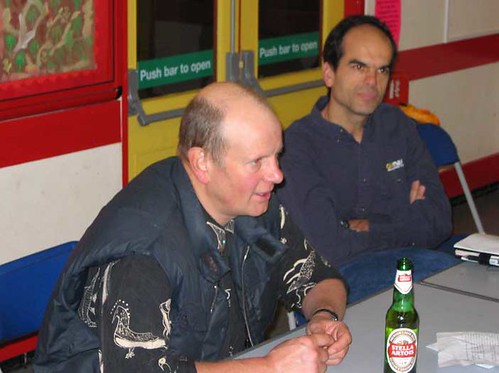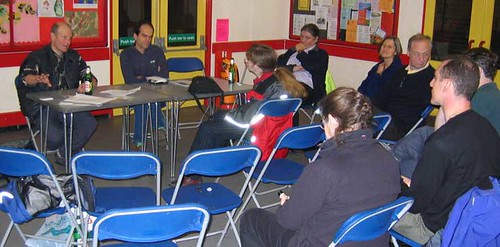Patrick Field came to our November members meeting.
Patrick started by saying that he is pleased to be back in Camden where he lived as a student in the 1970s. He became a land-use activist. He recalled pre-LCC days in 1975-6 when cyclists managed to get LB Camden to permit a right turn from Gloucester Avenue into Gloucester gate after a demonstration. In those days cycling was regarded as rather unusual.

Patrick has been cycle training since 1992-3. In those days it was unusual to train adults, whereas now it is seen as normal. He was spurred to start this by hearing people at LCC giving people phone advice on how to start cycling. He wanted to make cycling a more serious activity and encourage people to enjoy the luxury of cycle travel. The main aspects of training involve bike control, understanding how to fit in with traffic and personal attitude to cycling.
On the streets, Patrick finds all types of cyclists from diffident beginners to arrogant young men. He mentioned an experienced cyclist he met on the parliamentary bike ride who had been hit by a car door recently and asked what to do about it. The advice is to ride further away. But now there is a National Curriculum for riding a bike – people are being taught to a standard. Children have to learn that adults can behave badly.
Patrick finds cycling in London interesting. The inner boroughs provide some of the best places in UK to ride a bike and cycling is becoming trendy. But outer London provides the worst environment and cycling is in decline. The ring between the two could go either way – with Newham as an example where the majority don’t think of cycling and it is up to us to cycle regularly to promote cycling. The increase of P2Ws indicates that danger isn’t always a factor against.
There is still a feeling that cyclists are a menace. We must expect these attacks to continue. However we are winning, we don’t need to worry about parking, congestion charges and price of fuel. We should remember that the recent spread of foot and mouth was caused by the unnecessary transporting of animals and remind people of the advantages of human powered travel. The 20th century discovered the limits of the cheap fuel economy – one everyone has cars then there is a problem. Our primary role is as role models. Sometimes we should think of how to do it better. Our personal quest should be how to release our inner cyclist.

Questions.
Colin Murphy. Is it alright for motorists to train cyclists?
PF. Don’t label people as e.g. motorists or cyclists. Nobody chose the road situation as it now is. Road humps are a sign of crisis. Motorists are on the retreat (e.g. speed cameras, petrol crisis). Cycling will become the dominant mode.
George Coulouris. Why is it taking motorists so long to realise? What about people being competitive? What is the main obstacle?
PF. The highwater mark of cheap energy was about 1974. The transport revolution happened very quickly. People like the private space in their cars that they introduce into public space. Theft is main obstacle. Patrick advocates a basic bike for £60 for beginners. People think £300 is too much.
Stefano Casalotti: Which group should CCC promote training for?
PF. Start with adults – they can be responsible for themselves (1 in 4 women and 1 in 10 men can’t ride a bike).
Paul Gasson. Do you insist that children wear helmets?
PF. Some boroughs insist they do. Patrick tries to tell people the truth about helmets. He objects to non-cyclists telling people to do so. We should use the helmet issue to review road safety as a political issue.
Stefano Casalotti: What about segregation?
PF. Do you ride on main street with traffic or in back street with yobs? Turn it round, the presence of an infrastructure shows that cyclists are wanted.
Patrick subsequently pointed us to the website at: Less Traffic Home Page which contains plenty of interesting ideas about humanising the issue of how people behave in urban public space.
George Coulouris. Cycle tracks allow a cyclist to think about something else.
PF. It depends on what else is going on. Land use planning is zero sum game. People make the environment safe. There is a danger of cyclists being sidelined in side paths – cycling should be a central issue.
Martin Fahey. Asked to be allowed to give a general response to the philosophy. He thinks the Cycle Training Manual is fantastic. But says we need to cycle defensively as motorists are out to kill and other cyclists are unpredictable.
PF. It is the driver, not the car that is the hazard. The cyclist’s primary role is to keep safe, you should help less good cyclists and make it clear what you’re doing. Be kind, neutral and communicate with others.
Photos by George Coulouris


